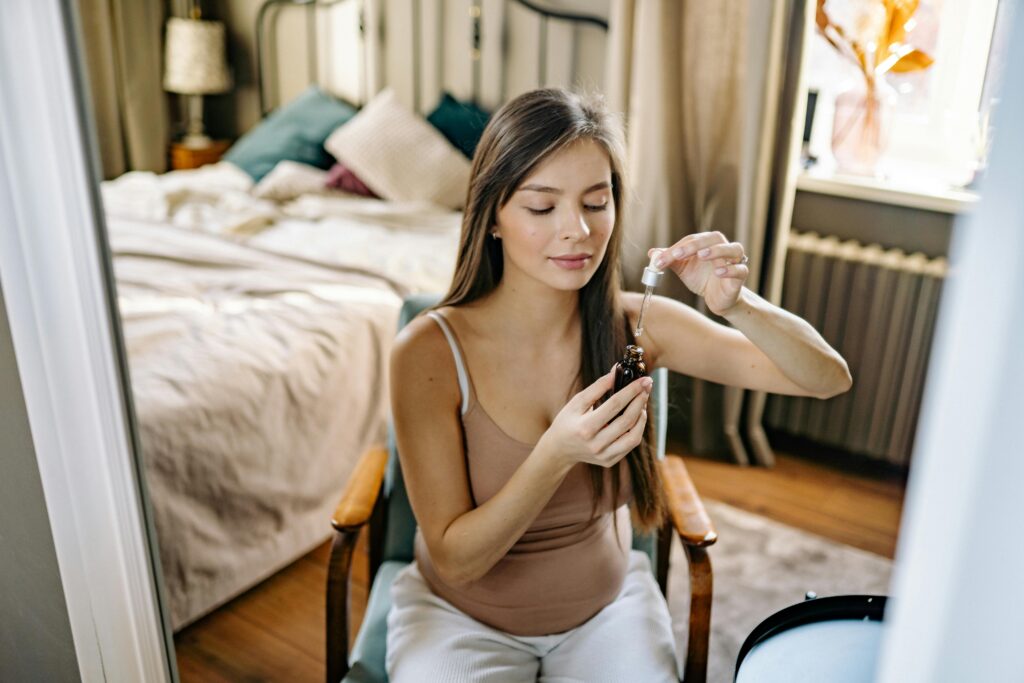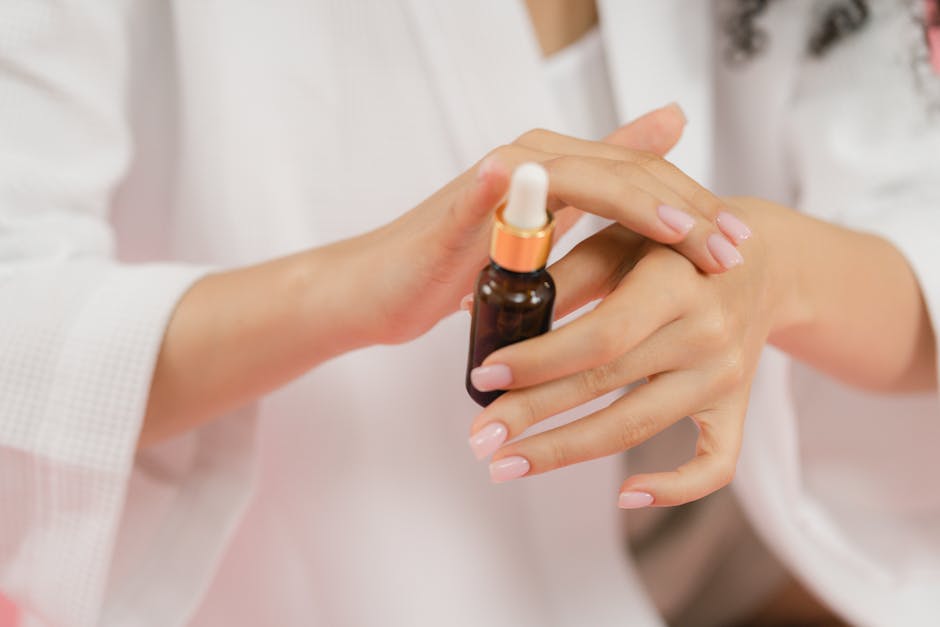Congratulations! Pregnancy is a beautiful and transformative journey. Your skin undergoes numerous changes as your body goes through remarkable transformations to create new life. You might be experiencing that famous “pregnancy glow,” or you might be dealing with new challenges like dryness, dark spots, or breakouts. But fear not, by following a safe and effective skincare routine, you can maintain healthy skin and boost your confidence throughout this special time. It is entirely normal to be unsure of which products are safe for your skin and which are not. This guide of ” Skincare routine for a Pregnant Woman” is here to help you navigate your skincare during these special nine months. We will focus on simple, safe, and easily accessible products, prioritizing your well-being and your baby’s safety above all else.
In Pakistan, where the climate, ranging from the hot summers of Karachi to the dry winters of Lahore, can also impact your skin, it’s essential to have a routine that is both gentle and effective.
Ingredients to Avoid in Pregnancy
Before we dive into building a skincare routine for a pregnant woman, it’s essential to know which ingredients to avoid during pregnancy, as some can be absorbed through the skin and may affect your developing baby. Here are three to steer clear of:
1. Retinoids (Retin-A, Retinol, Retinyl Palmitate): Used in anti-aging and acne products. Retinoids, both oral and topical, are linked to risks during pregnancy such as congenital disabilities; doctors advise caution even with topical forms due to potential absorption.
2. High-Dose Salicylic Acid: Commonly found in acne treatments. Although low-dose (2%) cleansers are generally considered safe, products such as peels, serums, or spot treatments with higher concentrations should be avoided during pregnancy.
3. Hydroquinone: This skin-lightening agent is absorbed through the skin in much higher amounts than many other ingredients, so it’s best avoided during pregnancy.
4. Formaldehyde: Found in some nail polish and hair straightening products. Formaldehyde exposure should be avoided during pregnancy due to potential health risks such as respiratory issues and allergic reactions.
5. Essential Oils: Many essential oils may not be safe during pregnancy. Unless specifically approved by your doctor, avoid applying essential oils directly to your skin during this time.
Golden Rule: When in doubt, always ask your gynecologist or a dermatologist. They can provide you with the best advice tailored to your specific situation. Remember, you’re not alone in this journey. Your healthcare provider is there to guide and support you.
The Safe & Effective Skincare Routine For a Pregnant Woman
Your routine doesn’t need to be complicated. A simple, consistent routine is the key to happy skin during pregnancy. Fewer steps mean less chance of irritation and are easier to follow, helping to reduce feelings of overwhelm. Research supports that minimalist skincare can effectively maintain skin health by focusing on essential care without unnecessary products. This approach not only simplifies the process but also boosts confidence in sticking to the plan.
Step 1: Cleansing (Do this twice a day)
The goal is to clean your skin without stripping it of its natural oils. Cleaning is essential because many Pakistani cities are plagued by excessive sweat, dust, and pollution.
- Morning: Use a gentle, hydrating cleanser. Look for ingredients like glycerin or coconut Oil. Many good, affordable Pakistani brands, such as Vaseline, Nivea, or Dove, offer gentle cream-based cleansers.
- Evening: You may want to “double cleanse” if you wear sunscreen or makeup, which you should! First, use a light Oil or micellar water to remove the makeup and sunscreen. Then, follow up with your gentle cleanser to wash everything away.
Step 2: Toning (optional, but beneficial)
A good alcohol-free toner can help balance your skin’s pH levels and add a layer of hydration.
How to Use: In Pakistan, look for toners that contain rose water (gulab jal), a traditional, natural, and completely safe ingredient. Gulab jal, cherished across generations, is often associated with the timeless beauty rituals of our grandmothers. It’s not just a toner; it’s a cultural embrace that speaks to our heritage and shared traditions. This affordable, pure ingredient can be found at most grocery stores or pharmacies in your area. Pat it on your face with cotton or your hands after cleansing. It smells excellent, refreshing, and calming. Aloe Vera gel can also be used as a calming toner when mixed with water.
Step 3: Moisturizing (The Key to Fighting Dryness!)
Hormonal changes can cause your skin to become dry and itchy.
For Face: Choose a fragrance-free moisturizer. Ingredients like hyaluronic acid, shea butter, and ceramides are excellent and safe. They help lock in moisture and keep your skin soft.
For Body: This is crucial. To prevent and treat stretch marks and itching, it is essential to thoroughly moisturize your body.
- Pure Coconut Oil (Giri Ka Tel): A fantastic natural moisturizer. Gently warm it and massage it onto your body.
- Shea Butter (Shea Makhan): Very thick and nourishing. Great for extra dry areas.
- Cocoa Butter: Another popular choice for stretch marks.
- Bio Oil: This is a very popular product among Pakistani mothers. It is specifically formulated to help improve the appearance of scars and stretch marks and is generally considered safe for use during pregnancy after the first trimester. However, if you have sensitive skin, it’s always a good idea to check the ingredients and talk to your doctor.
Tip: The best time to moisturize your body is right after a shower when your skin is still slightly damp. This helps to seal in the moisture.
Step 4: Sun Protection (Your BEST friend!)
This is the most crucial step, especially in Pakistan’s intense sun. Pregnancy can make your skin more sensitive to the sun and may cause melasma, the dark, patchy spots on your face often referred to as the “mask of pregnancy.” To turn sun protection into a daily habit, apply sunscreen right after breakfast, before leaving the room. By linking sunscreen application to your morning routine, you increase the likelihood that it becomes an automatic part of your daily routine.
What to use: Apply a broad-spectrum sunscreen with an SPF of at least 30. Because they sit on top of your skin and are not absorbed, mineral sunscreens containing zinc oxide or titanium dioxide are frequently recommended for pregnant women. They are gentle and effective.
Apply it every single morning, even if you are staying indoors. Reapply every two hours if you plan to go outside. Think of typical daily activities like the morning school run at 8 AM, a market visit at noon, or an afternoon stroll. These scenarios illustrate how easily sun exposure can be remembered. Keep your hands and neck in mind as well!
Step 5: Treating Specific Concerns
For Acne and Breakouts: Instead of salicylic acid, look for products with:
- Azelaic Acid: Excellent for killing bacteria and reducing redness. It’s available in creams and is often prescribed by doctors.
- Niacinamide: A very safe and versatile ingredient that helps control Oil, reduces redness, and improves your skin barrier.
- For Dark Spots (Melasma): The best treatment is prevention with a good sunscreen. After delivery, these spots often fade on their own. Avoid any skin-lightening products during pregnancy.
Natural & DIY Solutions from the Pakistani Kitchen
Many Pakistani households have natural ingredients that can be very soothing.
1. For a Glowing Face Mask: Mix chickpea flour (besan) with a bit of turmeric (haldi) and yogurt (dahi). This creates a gentle, exfoliating, and brightening mask. (To ensure that you are not allergic, perform a patch test first.)
2. For Soothing Puffy Eyes: Place chilled cucumber slices or used cold green tea bags on your closed eyes for 10 minutes.
3. For Overall Hydration: Drink plenty of water. Hydration starts from within.
Final Thoughts: You are Beautiful!
Pregnancy is a time to be kind to yourself. Your body is doing an incredible job. Some skin changes are temporary and will get better after you have your baby. The goal of this routine is not to achieve perfect skin, but to care for your skin in a safe, healthy, and gentle way. Listen to your body, stay hydrated, eat nutritious foods full of vitamins, and get enough rest. That inner wellness will contribute more to your glow than any product ever could. Enjoy this magical time and embrace the beautiful changes that occur, both within and around you.
A Simple Routine Chart
| Time of Day | Steps | Product Examples (Safe & Easily Available) |
| MORNING | 1. Cleanse2. Tone (Optional)3. Moisturize4. SUNSCREEN | Gentle Cleanser (Vaseline, Nivea)Rose Water (Gulab Jal)Light Moisturizer (Myjenpharm)SPF 30+ Mineral Sunscreen |
| EVENING | 1. Cleanse (Double if needed)2. Tone (Optional)3. Treat (If needed for acne)4. Moisturize | Gentle Cleanser / Micellar WaterRose Water (Gulab Jal)Azelaic Acid CreamRich Moisturizer |
| BODY CARE | Moisturize thoroughly | Coconut Oil, Shea Butter, Bio Oil |
⚠️ Important Precautionary Note: Please Read Before You Start
The information provided in this article is for general guidance and educational purposes only. It is based on widely accepted safety guidelines for skincare during pregnancy. The guidelines are based on consensus from major medical and dermatological organizations worldwide.
However, every pregnancy is unique.
1. Always Consult Your Doctor First: Your body and your baby are unique. Before using any new product, ingredient, or treatment, whether store-bought or natural, it is essential to discuss it with your gynecologist or a qualified dermatologist. They understand your personal health history and can provide you with the safest and most personalized advice.
2. Patch Test is a Must: Even if a product is labeled as “safe for pregnancy,” your skin might be more sensitive now. Always perform a patch test before using any new product entirely. Apply a small amount to your hand and wait 24 hours to see if there is any redness, itching, or reaction.
3. Listen to Your Body: If any product, even one you’ve used for years, starts causing irritation, discomfort, or a reaction during your pregnancy, stop using it immediately and consult your doctor.
4. Natural Doesn’t Always Mean Safe: Some natural ingredients and essential oils are not recommended during pregnancy. Do not assume a DIY recipe is safe without checking with a professional. Your health and the health of your baby are the most important things. When in doubt, always ask your doctor.
Want to know more about Precautionary Measures During Pregnancy? Visit https://kidshealth.org/en/parents/pregnancy-precautions.html


